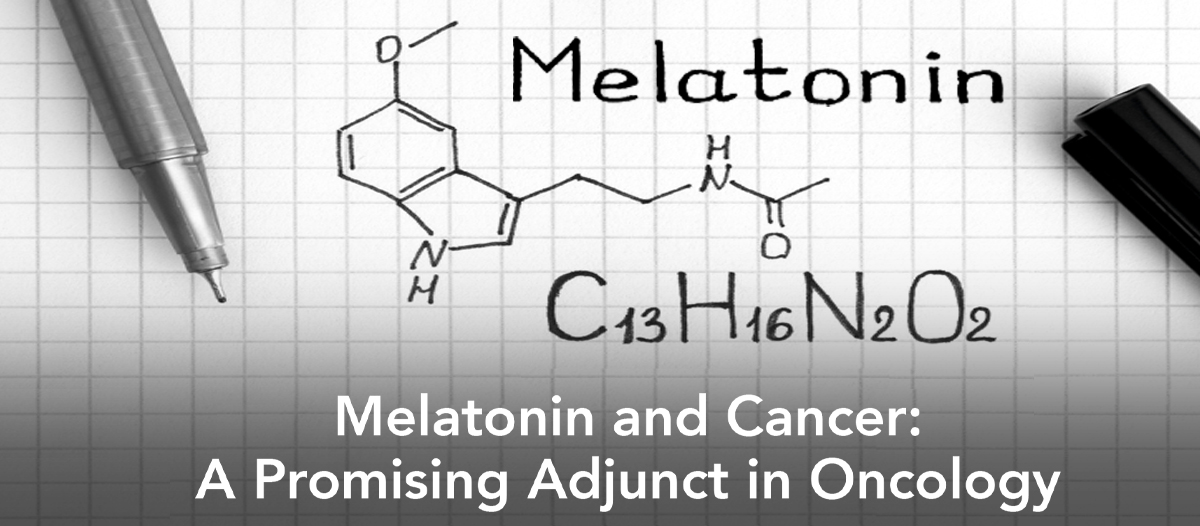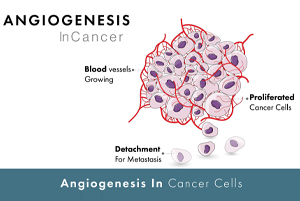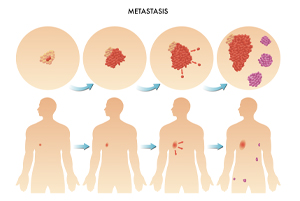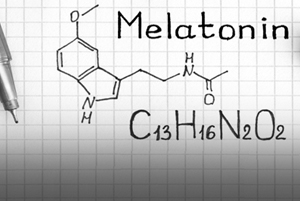Melatonin and Cancer: A Promising Adjunct in Oncology – Quick Summary
Melatonin, commonly known for regulating sleep, has emerged as a multifaceted ally in cancer care. Beyond its role in circadian rhythm, melatonin exhibits anti-cancer properties by inhibiting tumor growth, inducing apoptosis, and enhancing the efficacy of conventional therapies. Its antioxidant and anti-inflammatory effects further contribute to its potential as a supportive agent in oncology.
Key Takeaways:
✔ Inhibits tumor growth by disrupting cancer cell metabolism and inducing apoptosis
✔ Enhances the effectiveness of chemotherapy and radiotherapy while reducing their side effects
✔ Acts as a potent antioxidant, protecting cells from oxidative damage
✔ Modulates immune responses, aiding the body’s natural defense mechanisms
✔ Regulates hormonal activity, which may be beneficial in hormone-sensitive cancers
✔ Supports circadian rhythm, potentially improving overall treatment outcomes
Now, let’s get into the details!
Melatonin and Cancer: A Promising Adjunct in Oncology
by Mark J Kaylor
Over the past few decades, melatonin has garnered considerable attention in oncology research due to its multifaceted role in combating cancer. While most well-known for regulating circadian rhythms, melatonin has demonstrated a range of actions that may be highly beneficial in both cancer prevention and treatment. Numerous preclinical studies and clinical trials have explored melatonin’s potential anti-cancer properties, showing its ability to inhibit cancer cell growth, enhance the effectiveness of conventional therapies, and protect healthy tissues from the damaging side effects of chemotherapy and radiation.
-
Inhibition of Tumor Growth and Induction of Apoptosis
One of melatonin’s key mechanisms in cancer is its ability to inhibit tumor growth by disrupting cancer cell metabolism and inducing apoptosis, which is the programmed death of cancer cells. Cancer cells often evade apoptosis, allowing them to multiply unchecked. Melatonin helps restore this critical process. It does so by modulating several pathways, including:
- The p53 pathway, which is crucial for controlling cell cycle arrest and apoptosis. Melatonin has been shown to activate p53, leading to apoptosis in various cancer cell types, including breast and prostate cancer.
- Caspase activation, another important mechanism through which melatonin promotes apoptosis. Caspases are protease enzymes that trigger the disassembly of cellular components during apoptosis. Melatonin has been found to increase caspase activity in different cancer cells, further promoting cell death.
In several studies, melatonin has also been shown to reduce cell proliferation in cancers such as liver, lung, colon, and breast cancer by suppressing key signaling pathways that cancer cells use to proliferate, such as the PI3K/AKT/mTORand NF-κB pathways.
-
Inhibition of Angiogenesis
Angiogenesis, the formation of new blood vessels, is critical for tumor growth and metastasis, as it allows the tumor to obtain the oxygen and nutrients it needs to thrive. Melatonin has demonstrated the ability to inhibit angiogenesis by downregulating pro-angiogenic factors, including vascular endothelial growth factor (VEGF) and matrix metalloproteinases (MMPs), which are essential for new blood vessel formation. By reducing the blood supply to tumors, melatonin can effectively starve cancer cells of the nutrients and oxygen they need to grow and spread.
-
Anti-Metastatic Properties
Melatonin’s anti-metastatic effects are another promising aspect of its anti-cancer action. Metastasis, or the spread of cancer from the primary site to distant organs, is a leading cause of cancer-related death. Melatonin has been shown to prevent metastasis by:
- Inhibiting cell migration and invasion: Melatonin reduces the ability of cancer cells to detach and migrate to new areas of the body. It achieves this by altering the cytoskeletal structure of cancer cells and downregulating enzymes like MMP-2 and MMP-9, which cancer cells use to break through surrounding tissues and invade new areas.
- Modulating cell adhesion molecules: Cancer cells rely on adhesion molecules to move through the bloodstream and adhere to new tissues. Melatonin decreases the expression of these molecules, further limiting the spread of cancer.
-
Melatonin as an Antioxidant and Anti-Inflammatory Agent in Cancer
Oxidative stress and chronic inflammation are two key factors that promote cancer development and progression. Melatonin, as a potent antioxidant, directly scavenges harmful reactive oxygen species (ROS) and reactive nitrogen species (RNS), which can damage DNA, proteins, and lipids—mutations in these molecules are often the triggers for cancerous growth. In addition, melatonin indirectly boosts the body’s antioxidant defenses by increasing the activity of antioxidant enzymes such as superoxide dismutase (SOD), catalase, and glutathione peroxidase.
Chronic inflammation also plays a pivotal role in the development and progression of many cancers, including colorectal, lung, and pancreatic cancers. Melatonin suppresses inflammatory mediators like nuclear factor kappa B (NF-κB) and pro-inflammatory cytokines such as tumor necrosis factor-alpha (TNF-α) and interleukin-6 (IL-6), reducing the inflammatory environment that favors tumor growth and survival.
-
Synergistic Effects with Conventional Cancer Therapies
One of melatonin’s most exciting potential applications in cancer treatment is its ability to enhance the efficacy of conventional cancer therapies like chemotherapy and radiation while simultaneously reducing their toxic side effects. This is particularly important because many cancer treatments can damage healthy cells and tissues, leading to severe side effects such as immune suppression, fatigue, and organ damage.
- Enhancing Chemotherapy and Radiation Efficacy: Melatonin has been found to improve the sensitivity of cancer cells to chemotherapy and radiation therapy. This means that lower doses of these therapies may be needed when combined with melatonin, potentially reducing harmful side effects. In studies, melatonin has enhanced the therapeutic effects of drugs like doxorubicin and cisplatin in treating various cancers, including breast, ovarian, and lung cancers. The hormone does this by sensitizing cancer cells to the damaging effects of chemotherapy and radiation while protecting normal cells from oxidative damage.
- Protection from Side Effects: The toxicity of chemotherapy and radiation can severely weaken patients, affecting their quality of life and limiting the effectiveness of the treatment. Melatonin has shown promise in reducing some of the most common side effects of these therapies, including:
- Myelosuppression: Chemotherapy often causes bone marrow suppression, leading to a decreased production of blood cells and increased infection risk. Melatonin has been shown to protect bone marrow cells from damage.
- Neurotoxicity: Some chemotherapeutic agents, such as cisplatin, can cause nerve damage, resulting in peripheral neuropathy. Melatonin’s antioxidant properties may help protect neurons from this damage, reducing the risk of chemotherapy-induced neuropathy.
- Fatigue: Cancer-related fatigue is one of the most debilitating side effects of treatment, and melatonin’s ability to improve sleep and reduce inflammation can help alleviate this condition.
-
Melatonin’s Role in Hormone-Dependent Cancers
Melatonin’s role in regulating hormones may be especially relevant in hormone-dependent cancers, such as breast and prostate cancers. Melatonin has been shown to interact with estrogen receptors, potentially inhibiting estrogen-stimulated growth in hormone-sensitive cancers. For example, in breast cancer, melatonin reduces the activation of estrogen receptor alpha (ERα), which is linked to the proliferation of breast cancer cells. This effect has led to research into melatonin as an adjunct treatment for estrogen-positive breast cancer patients, especially those undergoing anti-estrogen therapies like tamoxifen.
-
Clinical Trials and Research on Melatonin and Cancer
Clinical studies have provided encouraging evidence for melatonin’s role in cancer treatment. A meta-analysis of randomized controlled trials revealed that melatonin supplementation, at doses ranging from 10 mg to 40 mg per day, significantly improved overall survival rates in cancer patients. The same analysis noted that melatonin reduced the adverse effects of chemotherapy and radiation, including fatigue and immunosuppression, and improved patients’ quality of life.
One notable study found that patients with solid tumors (e.g., breast, colorectal, and lung cancers) who received melatonin alongside their standard cancer treatments had a 45% higher survival rate compared to those who did not receive melatonin. This study also reported that melatonin improved the efficacy of conventional treatments, suggesting its potential as a supportive therapy in oncology.
-
Melatonin and Immune Modulation in Cancer
Melatonin plays a key role in immune system regulation, which is crucial for the body’s ability to fight off cancer. It can stimulate the activity of immune cells like natural killer (NK) cells and T lymphocytes, which are essential for identifying and destroying cancer cells. Melatonin also helps to restore the balance between pro-inflammatory and anti-inflammatory cytokines, potentially enhancing the immune system’s ability to combat tumor cells.a
References:
- Hill SM, Belancio VP, Dauchy RT, Xiang S, Brimer S, Mao L, Hauch A, Lundberg PW, Summers W, Yuan L, Frasch T, Blask DE. Melatonin: an inhibitor of breast cancer. Endocr Relat Cancer. 2015 Jun;22(3):R183-204. .
-
- This article details how melatonin influences hormone-dependent cancers like breast cancer by modulating estrogen receptor activity and inhibiting growth.
- Reiter, R. J., Rosales-Corral, S., Tan, D. X., Acuña-Castroviejo, D., Qin, L., & Yang, S. F. (2017).”Melatonin, a full-service anti-cancer agent: Inhibition of initiation, progression and metastasis.” Journal of Pineal Research, 63(4), e12427.
- This paper reviews the many ways melatonin contributes to inhibiting cancer progression, including its effects on angiogenesis, apoptosis, and metastasis.
- Seely, D., Wu, P., Fritz, H., Kennedy, D. A., Tsui, T., & Seely, A. J. E. (2012). “Melatonin as adjunctive cancer care with and without chemotherapy: A systematic review and meta-analysis of randomized trials.” Integrative Cancer Therapies, 11(4), 293-303.
- This meta-analysis focuses on clinical trials where melatonin was used alongside conventional cancer treatments, showing improved survival rates and reduced side effects.
- Srinivasan, V., Spence, D. W., Pandi-Perumal, S. R., Brown, G. M., & Cardinali, D. P. (2008). “Melatonin, environmental light, and breast cancer.” Breast Cancer Research and Treatment, 108, 339–350.
- This review discusses melatonin’s role in inhibiting breast cancer by suppressing estrogen-driven pathways and its relationship to light exposure.
- Garcia-Santos, G., Antolin, I., Herrera, F., Martin, V., Rodriguez-Blanco, J., & Medina, M. (2006).”Melatonin induces apoptosis in human neuroblastoma cancer cells.” Journal of Pineal Research, 41(2), 130–135. Link
- This study provides evidence for melatonin’s pro-apoptotic effects in neuroblastoma cells, contributing to its potential anti-cancer role.
Mark J. Kaylor is a passionate advocate for holistic health and natural remedies, with a focus on extending both lifespan and healthspan. As the founder of the Radiant Health Project and host of Radiant Health Podcast, Mark blends in-depth research with traditional wisdom to empower others on their journey to vibrant health. Through his writing and speaking, he shares insights into the transformative power of herbs, nutrition, and lifestyle practices.
Disclaimer: All information and results stated here is for educational and entertainment purposes only. The information mentioned here is not specific medical advice for any individual and is not intended to be used for self-diagnosis or treatment. This content should not substitute medical advice from a health professional. Always consult your health practitioner regarding any health or medical conditions.











